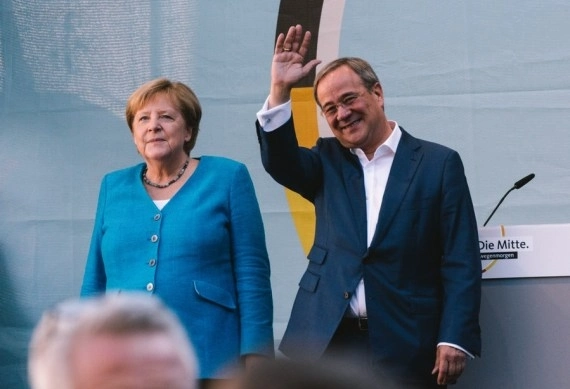Germany's centre-left Social Democrats have narrowly beaten the conservative party of outgoing Chancellor Angela Merkel in national elections, according to preliminary results.
The Social Democrats (SPD) leader Olaf Scholz says he has a clear mandate to form a government, but his conservative rival, Armin Laschet, has declared that he will fight on as neither party has won an absolute majority and a coalition will determine who will rule.
The centre-left Social Democrats (SPD) won 25.7% votes ahead of 24.1% for Merkel's CDU/CSU conservative bloc. The Greens came in next with 14.8% followed by the liberal business-friendly FDP with 11.5% while the far right AfD got 10.3% share, according to official figures released by the German federal returning officer.
With neither major bloc commanding a majority, and both reluctant to repeat their awkward "grand coalition" of the past four years, the most likely outcome is a three-way alliance led by either the Social Democrats or Merkel's conservatives, according to a Reuters report from Berlin.
However, it could take months for a new coalition to take shape which means Merkel would continue in a caretaker role as the Chancellor.
This time around the Greens and liberals have emerged as the kingmakers as they are looking for a role in a new coalition.
The Greens’ candidate for chancellor, Annalena Baerbock, who will now play the role of kingmaker in coalition talks, has led the party to its best ever result in a national election but the fight has not been free of controversy.
She was accused, during the poll campaign, of lifting five passages in her recently published book from news articles and Wikipedia entries without crediting them which had come as a setback to the party which had started as favourite.
"We wanted more. We didn't achieve that, partly because of our own mistakes at the beginning of the campaign — mistakes on my part," German broadcaster DW cited Baerbock as telling her supporters after the results
Christian Lindner, who has led the business-friendly FDP since 2013, will be the second kingmaker in Germany’s coalition negotiations. The 42-year-old took on the party’s leadership in 2013, after a disastrous election result, which saw it exit the Bundestag.
"Two maybe-chancellors and two kingmakers" – was one of the headlines summing up Sunday night's rather scrappy result, but that is what it looked like, according to BBC News.
Because it's not just the Social Democrat and conservative leaders fighting for power. The two kingmakers are open to offers.
Together the Liberals and the Greens make up over 25% of the vote and would carry both of the big parties over the line. However, there are serious differences between the two parties.
Greens leader Annalena Baerbock wants to loosen Germany's debt brake that stops a big jump in public debt. FDP leader Christian Lindner has little time for her party's "ideas of tax hikes, or softening the debt brake".
But of all the possible coalitions, the Greens and the Liberals feature in the two that are most likely to form.
Also read: Xi, Merkel talk on ties, multilateral cooperation




















